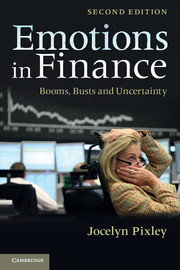Book contents
- Frontmatter
- Contents
- Acknowledgements
- Abbreviations
- Interviews
- Introduction
- 1 Modern money, modern conflicts
- 2 Corporate suspicion in the kingdom of rationality
- 3 Financial press as trust agencies
- 4 Required distrust and the onus of a bonus
- 5 Managing credibility in central banks
- 6 Hierarchies of distrust from trust to bust
- 7 Overwhelmed by numbers
- 8 The time-utopia in finance
- 9 Taming the god of opportunism
- References
- Index
2 - Corporate suspicion in the kingdom of rationality
Published online by Cambridge University Press: 05 June 2012
- Frontmatter
- Contents
- Acknowledgements
- Abbreviations
- Interviews
- Introduction
- 1 Modern money, modern conflicts
- 2 Corporate suspicion in the kingdom of rationality
- 3 Financial press as trust agencies
- 4 Required distrust and the onus of a bonus
- 5 Managing credibility in central banks
- 6 Hierarchies of distrust from trust to bust
- 7 Overwhelmed by numbers
- 8 The time-utopia in finance
- 9 Taming the god of opportunism
- References
- Index
Summary
Corporate attempts to conquer uncertainty are behind financial booms, and lead to busts only too quickly. Trust and distrust are primary drivers, we will see. Chapter 1 looked at money's inevitable uncertainties and ‘ideal’ positive outcomes. This chapter shows how money's special emotions in Anglo-Saxon countries are institutionalised. Coping strategies became rules/habits and impersonal suspicion, in a quasi-infrastructure of trust agents meant to stabilise claims/distrust between creditors, debtors and the ‘community’. None can predict. Stability is tentative; default is never unthinkable; past trust can shatter.
Banks create money – extend it for fees – on promises of debtors. Firms, governments, taxpayers and households are borrowers. Lenders are private banks, money funds, central banks and the public if bondholders, depositors or savers. All depend on chains of trust. Money's critical, ideal role in economic activity is its benign social purpose. Private creditors finance national debt for sound government activities, allowing favourably priced credit to foster economic activity which a government taxes. But since the future is unpredictable, ‘ventures may fail, taxes cannot be collected, debts cannot be repaid’ (Ingham 2004: 132–3). Economic decline can set in. All decisions are made under uncertainty; there are only expectations, mirages, about the future. This fragile relation is bonded with trust; bonds are one expression of this trust; interest rates ‘indicate’ this abstract trust or distrust.
- Type
- Chapter
- Information
- Emotions in FinanceBooms, Busts and Uncertainty, pp. 36 - 68Publisher: Cambridge University PressPrint publication year: 2012



